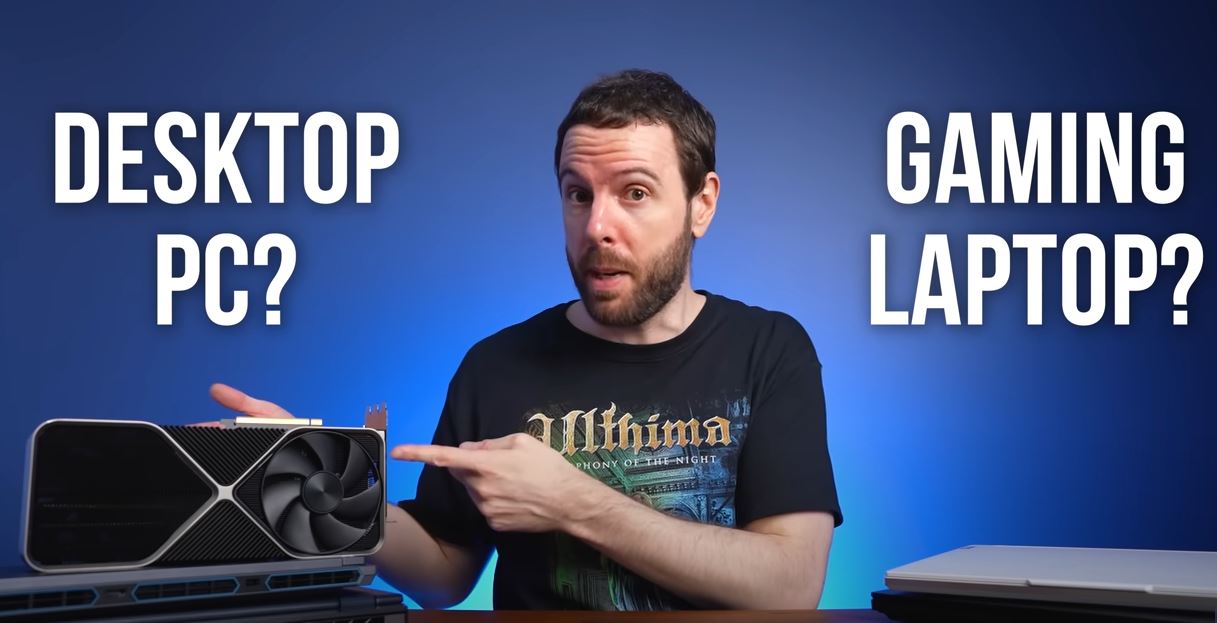Choosing between a gaming laptop and a desktop PC can be a tough decision, as both have their own sets of advantages and disadvantages depending on your needs. In this guide, we’ll break down the top 5 differences between gaming laptops and desktop PCs to help you make an informed choice.
1. Portability
The most obvious difference between a gaming laptop and a desktop PC is portability.
-
Gaming Laptop: A gaming laptop is designed to be portable. It’s compact, lightweight, and all-in-one, meaning it includes everything you need—screen, keyboard, touchpad, speakers, and a battery—inside a single unit. This makes it easy to carry around, whether you’re moving between your home, school, work, or a friend’s house. Laptops are especially beneficial for people who have limited physical space, such as students living in dorms or those working in shared spaces.
-
Desktop PC: On the other hand, a desktop PC is far less portable. Even smaller Mini ITX systems, which are designed for portability, still require a separate monitor, keyboard, mouse, and power source, making them cumbersome to transport. Desktop PCs are best suited for stationary setups where portability is not a priority.
2. Performance
When it comes to performance, desktop PCs generally have the upper hand.
-
Desktop PC: Desktops are typically more powerful because they have fewer space constraints. This allows for better cooling solutions and higher power limits, translating to superior performance, especially with high-end components. For instance, desktop GPUs generally outperform their laptop counterparts, even if they share the same name. For example, a desktop RTX 4090 outperforms a laptop RTX 4090 by around 49%. The larger VRAM and higher power ceilings contribute to this performance gap.
-
Gaming Laptop: While laptops have less room for cooling and lower power limits, modern gaming laptops are still highly capable. A mid-range gaming laptop with an NVIDIA RTX 4060 or 4070 GPU can run most modern games at 1440p with high settings. However, the performance gap becomes more apparent with higher-end components due to space and power limitations in laptops. Additionally, gaming laptops lose significant performance when running on battery power, so they are best used while plugged into a power outlet.
3. Upgradeability
Upgrade optionsare another key difference between gaming laptops and desktop PCs.
-
Desktop PC: Desktops are highly upgradeable. You can replace or upgrade nearly every component, including the CPU, GPU, RAM, storage, motherboard, and more. This flexibility allows desktop users to keep their systems up-to-date with the latest technology for many years.
-
Gaming Laptop: In contrast, gaming laptops have limited upgradeability. Typically, you can only upgrade the RAM, storage, and sometimes the Wi-Fi card. Very few laptops offer socketable CPUs or GPUs, making it difficult to upgrade these components. As a result, you’re generally stuck with the same CPU and GPU for the life of the laptop. If you want more power, you’ll likely need to buy a new laptop.
4. Price
Costis a crucial factor when choosing between a gaming laptop and a desktop PC.
-
Gaming Laptop: Laptops usually cost more than desktops for equivalent performance. The compact design and integration of components like the screen, keyboard, and battery add to the cost. For example, a gaming laptop with an RTX 4080 GPU might cost around $1,750 USD, which is only slightly more expensive than a mid-range desktop PC with a similar level of performance. However, the laptop also includes a built-in screen, keyboard, and mouse, which would be additional costs for a desktop setup.
-
Desktop PC: While desktop PCs can be more cost-effective, especially if you build your own, the price can vary depending on the components you choose. Desktops also tend to use more power, which could increase your electricity costs over time, especially if you’re running high-performance components that demand more energy.
5. Use Cases and Versatility
Lastly, the use cases and versatilityof gaming laptops and desktop PCs can influence your decision.
-
Gaming Laptop: A gaming laptop is versatile and can serve multiple purposes. It’s great for users who need to balance gaming with portability. If you travel frequently or need a machine that can handle both gaming and productivity tasks on the go, a gaming laptop is a solid choice. For those who don’t need extreme gaming performance while traveling, a mid-range gaming laptop or even a thin and light laptop without discrete graphics might be sufficient.
-
Desktop PC: Desktops are ideal for users who prioritize performance and upgradeability over portability. They are perfect for stationary setups where space is not an issue. Many users opt for a hybrid approach, using a powerful desktop PC at home for gaming and a lighter laptop for portable tasks.
In the end, the choice between a gaming laptop and a desktop PC comes down to your specific needs and priorities.
-
Choose a gaming laptopif you need portability, a compact setup, and decent performance on the go.
-
Opt for a desktop PCif you value performance, upgradeability, and don’t mind a stationary setup.
Both options have their place, and the best choice depends on your lifestyle and how you plan to use the device. If you’re leaning towards a gaming laptop, be sure to check out our reviews of the best gaming laptops of the year. We review over 30 gaming laptops annually, and our top 5 picks are definitely worth considering!

